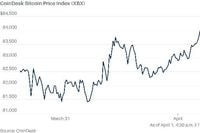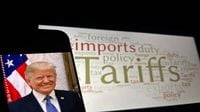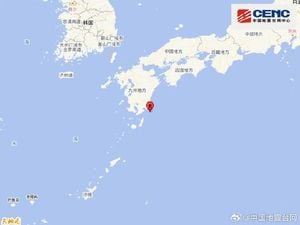Bitcoin is making a slight recovery as it bounces back from losses experienced in the previous session. This comes as traders exercise caution ahead of the anticipated U.S. reciprocal tariffs set to be unveiled on April 2, 2025. President Donald Trump stated on March 31, 2025, that he would be "very kind" to trading partners when announcing the tariffs, which he indicated would target all countries, reflecting the administration's aggressive trade stance.
As concerns mount over the impending tariffs, gold prices surged to a record high on April 1, 2025, as investors sought refuge from the uncertainty surrounding the U.S. trade policy. The rise in gold's price is attributed to fears of inflation and a potential economic downturn that could follow the new tariffs.
Treasury Secretary Scott Bessent confirmed that Trump’s announcement regarding the tariffs is scheduled for 3 PM ET on April 1, 2025. Meanwhile, Cory Booker, a prominent senator, has taken to the Senate floor to protest against the measures enacted by Trump’s administration, asserting that in just 71 days, the president has caused significant harm to American safety, financial stability, and the core foundations of democracy. "These are not normal times in America, and they should not be treated as such in the United States Senate," Booker declared.
The U.S. Trade Representative's office has raised concerns about India's stringent import rules, which complicate trade and have been highlighted in a report released just days before the tariffs take effect. The report outlines various obstacles, including customs rules, import restrictions, licensing requirements, and high taxes on imports that hinder American products from entering the Indian market.
In response to the looming tariffs, a senior EU official warned that the European Union is prepared to respond strongly if new tariffs are imposed by the United States. The EU aims to negotiate and reach an agreement with the U.S. but is ready to protect its businesses if necessary.
Trump’s tariffs are expected to include a proposal to impose duties of around 20% on nearly all imports. These tariffs may particularly impact the pharmaceutical sector, as India is a significant supplier of medications to the U.S. Experts predict that if these taxes are enacted, the cost of imported medicines could rise by approximately 10%. Citi analysts suggest that pharmaceutical companies may attempt to pass these costs onto consumers, but it could prove challenging for them to do so fully.
As the April 2 deadline approaches, market analysts are increasingly concerned about the potential repercussions of the tariffs. Goldman Sachs has raised the likelihood of a U.S. recession over the next year to 35%, attributing the increase to deteriorating economic conditions and escalating trade tensions. The firm has also revised its growth forecast downward for 2025, citing the adverse effects of the new tariffs.
Geoffrey Dennis, an expert on emerging markets, expressed concern about how the new tariffs will affect developing countries, particularly those that export more to the U.S. than they import. He noted that in 2024, significant developing countries such as China, India, Taiwan, and Korea were among the top exporters to the U.S. Dennis emphasized that the ongoing threat of tariffs will keep these markets under scrutiny.
The unpredictable nature of the tariff announcements has left many businesses struggling to plan effectively. Seth Freeman, a managing director at GlassRatner Advisory & Capital Group, stated, "This is new territory to use tariffs like this… the on-again, off-again delays and changes are very disruptive for the markets." This sentiment underscores the challenges companies face in navigating the current trade landscape.
Japan’s Prime Minister, Shigeru Ishiba, is actively seeking to prevent new tariffs on imported cars from Japan, which are set to begin on April 3, 2025. Ishiba has expressed his willingness to travel to Washington to discuss the matter directly with Trump.
As the situation unfolds, the British government is also monitoring the potential impact of the U.S. tariffs, with hopes of negotiating a new trade deal that could exempt British goods from the impending taxes. Business Minister Jonathan Reynolds stated that while the government remains optimistic, they are prepared for the possibility of imposing their own tariffs on American goods if a deal cannot be reached.
Market experts believe that the tariffs could lead to a significant shift in manufacturing strategies, with companies potentially relocating their production to the U.S. to avoid the additional costs. Yoko Kubota from The Wall Street Journal noted that such a move could hollow out manufacturing in Asia, affecting local economies.
In the midst of these developments, Borosil Renewables, an Indian manufacturer, has expressed optimism about potentially benefiting from stringent duties on Chinese imports, which could allow them to capture a larger market share in the U.S.
The upcoming tariff announcement is not only a critical moment for U.S. trade policy but also a pivotal point for global markets. Companies and investors alike are bracing for continued volatility as the implications of these tariffs unfold. Sunil Koul, a strategist at Goldman Sachs, suggested that the announcement could serve as a "clearing event" that might initiate further negotiations between countries, although the uncertainty surrounding the final tariff rates will likely weigh heavily on investor sentiment.
As the clock ticks down to the April 2 announcement, all eyes are on the White House, where Trump is expected to unveil specific tariffs targeting nations that impose duties on American goods. The implications of this decision will reverberate through global markets, affecting trade relationships and economic stability for months to come.





